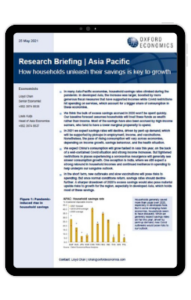APAC | How households unleash their savings is key to growth

A great uncertainty for the growth outlook is the extent to which households will spend the additional savings they’ve accumulated once normal conditions resume. We recently concluded that for advanced economies, the upside risks to our relatively optimistic baseline from an estimated US$4.7tn of excess savings are material. This issue is also important for Asia-Pacific’s economies.
What you will learn from this report:
- In many Asia-Pacific economies, household savings rates climbed during the pandemic. In developed Asia, the increase was larger, boosted by more generous fiscal measures that have supported incomes while Covid restrictions hit spending on services, which account for a bigger share of consumption in these economies.
- In 2021 we expect savings rates will decline, driven by pent-up demand, which will be supported by pickups in employment, income, and vaccinations.
- China’s consumption will grow fastest in Asia this year, on the back of a well-contained Covid situation and strong income increases. But tightened restrictions in places experiencing a coronavirus resurgence will generally see slower consumption growth.
Tags:
Related Services

Post
US Key Themes 2026: Exceptionalism amid fragmentation
US exceptionalism is alive and well, and that won't change in 2026.
Find Out More
Post
Global Key themes 2026: Bullish on US despite AI bubble fears
We anticipate another year of broadly steady and unexceptional global GDP growth, but with some more interesting stories running below the surface.
Find Out More